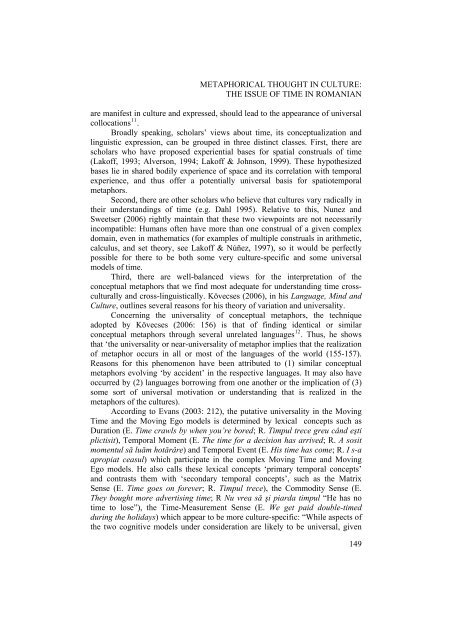culture, subculture and counterculture - Facultatea de Litere
culture, subculture and counterculture - Facultatea de Litere
culture, subculture and counterculture - Facultatea de Litere
You also want an ePaper? Increase the reach of your titles
YUMPU automatically turns print PDFs into web optimized ePapers that Google loves.
METAPHORICAL THOUGHT IN CULTURE:<br />
THE ISSUE OF TIME IN ROMANIAN<br />
are manifest in <strong>culture</strong> <strong>and</strong> expressed, should lead to the appearance of universal<br />
collocations 11 .<br />
Broadly speaking, scholars’ views about time, its conceptualization <strong>and</strong><br />
linguistic expression, can be grouped in three distinct classes. First, there are<br />
scholars who have proposed experiential bases for spatial construals of time<br />
(Lakoff, 1993; Alverson, 1994; Lakoff & Johnson, 1999). These hypothesized<br />
bases lie in shared bodily experience of space <strong>and</strong> its correlation with temporal<br />
experience, <strong>and</strong> thus offer a potentially universal basis for spatiotemporal<br />
metaphors.<br />
Second, there are other scholars who believe that <strong>culture</strong>s vary radically in<br />
their un<strong>de</strong>rst<strong>and</strong>ings of time (e.g. Dahl 1995). Relative to this, Nunez <strong>and</strong><br />
Sweetser (2006) rightly maintain that these two viewpoints are not necessarily<br />
incompatible: Humans often have more than one construal of a given complex<br />
domain, even in mathematics (for examples of multiple construals in arithmetic,<br />
calculus, <strong>and</strong> set theory, see Lakoff & Núñez, 1997), so it would be perfectly<br />
possible for there to be both some very <strong>culture</strong>-specific <strong>and</strong> some universal<br />
mo<strong>de</strong>ls of time.<br />
Third, there are well-balanced views for the interpretation of the<br />
conceptual metaphors that we find most a<strong>de</strong>quate for un<strong>de</strong>rst<strong>and</strong>ing time crossculturally<br />
<strong>and</strong> cross-linguistically. Kövecses (2006), in his Language, Mind <strong>and</strong><br />
Culture, outlines several reasons for his theory of variation <strong>and</strong> universality.<br />
Concerning the universality of conceptual metaphors, the technique<br />
adopted by Kövecses (2006: 156) is that of finding i<strong>de</strong>ntical or similar<br />
conceptual metaphors through several unrelated languages 12 . Thus, he shows<br />
that ‘the universality or near-universality of metaphor implies that the realization<br />
of metaphor occurs in all or most of the languages of the world (155-157).<br />
Reasons for this phenomenon have been attributed to (1) similar conceptual<br />
metaphors evolving ‘by acci<strong>de</strong>nt’ in the respective languages. It may also have<br />
occurred by (2) languages borrowing from one another or the implication of (3)<br />
some sort of universal motivation or un<strong>de</strong>rst<strong>and</strong>ing that is realized in the<br />
metaphors of the <strong>culture</strong>s).<br />
According to Evans (2003: 212), the putative universality in the Moving<br />
Time <strong>and</strong> the Moving Ego mo<strong>de</strong>ls is <strong>de</strong>termined by lexical concepts such as<br />
Duration (E. Time crawls by when you’re bored; R. Timpul trece greu când eşti<br />
plictisit), Temporal Moment (E. The time for a <strong>de</strong>cision has arrived; R. A sosit<br />
momentul să luăm hotărâre) <strong>and</strong> Temporal Event (E. His time has come; R. I s-a<br />
apropiat ceasul) which participate in the complex Moving Time <strong>and</strong> Moving<br />
Ego mo<strong>de</strong>ls. He also calls these lexical concepts ‘primary temporal concepts’<br />
<strong>and</strong> contrasts them with ‘secondary temporal concepts’, such as the Matrix<br />
Sense (E. Time goes on forever; R. Timpul trece), the Commodity Sense (E.<br />
They bought more advertising time; R Nu vrea să şi piarda timpul “He has no<br />
time to lose”), the Time-Measurement Sense (E. We get paid double-timed<br />
during the holidays) which appear to be more <strong>culture</strong>-specific: “While aspects of<br />
the two cognitive mo<strong>de</strong>ls un<strong>de</strong>r consi<strong>de</strong>ration are likely to be universal, given<br />
149












